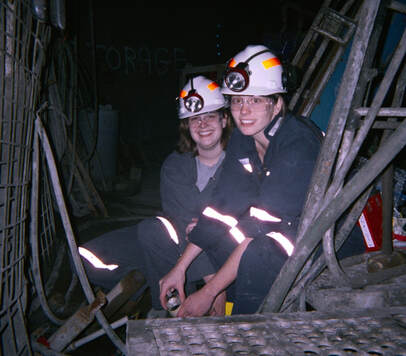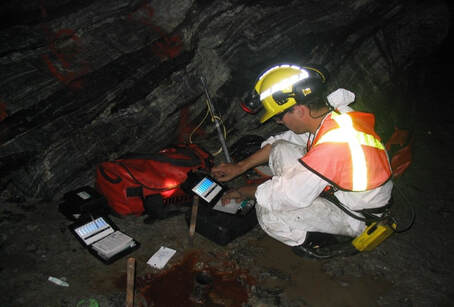POSTDOCTORAL POSITIONS IN FLUID-ROCK INTERACTIONS & INVESTIGATION OF DEEP SUBSURFACE LIFE
Stable Isotope Laboratory, University of Toronto
With implications from deep subsurface biodiversity, the habitability of Earth, Mars and the icy moons, the competing use of the Earth’s subsurface for water resources, materials to fuel the energy transition, and potential sites for waste disposal, CCS or hydrogen storage, Subsurface Science and Exploration is a topical theme with a wealth of fundamental research questions. One or more postdoctoral positions are available for research projects on the origin, residence times and geochemical signatures of deep crustal fluids and the subsurface microbial communities that are sustained by water-rock reactions in the deep Earth. Field, laboratory and modelling opportunities are available to extend the existing program to explore the implications of our work on Earth analogs to the search for life on the rocky bodies and ocean worlds of our solar system. A particular recruitment focus at the present time is for those with interest and skills in surface and micro-analysis of mineral surfaces and/or fluid inclusions to investigate the evidence of water-rock reaction from the rocks and minerals themselves, to complement team members already focusing on fluids and dissolved gases.
Applicants with a PhD in geochemistry, geobiology, hydrogeology, chemistry, microbiology, planetary sciences or related disciplines are all encouraged to apply.
The University of Toronto is committed to an equitable, diverse, and inclusive workforce. We welcome applications from all qualified persons. We encourage women; First Nations, Métis and Inuit persons; members of visible minority groups; persons with disabilities; persons of any sexual orientation or gender identity and expression; and all those who may contribute to the further diversification of ideas to apply.
Recent Team Publications:
Sherwood Lollar, B., Warr, O., Higgins, P.M. (2024) The Hidden Hydrogeosphere – An expanded vision of the planetary water cycle. Annual Reviews of Earth and Planetary Sciences 52:15.1-15.24. https://doi.org/10.1146/annurev-earth-040722-102252.
Nissan. D., Kieft, T., Drake, H., Warr, O., Sherwood Lollar, B., Ogasawara, H., Perl, S., Freifeld, B., Castillo, J., Whitehouse, M., Kooijman, E. and Onstott, T.C. (2023) Hydrogeochemical and isotopic signatures elucidate deep subsurface hypersaline brine formation through radiolysis driven water-rock interaction. Geochimica Cosmochimica acta 340:65-84.
Cheng, A., Sherwood Lollar, B., Gluyas, J. and Ballentine, C.J. (2023) Primary N2-He gas field formation in intracratonic sedimentary basins. Nature 615:94-99. Doi.org/10.1038/s41586-022-05659-0.
Warr, O., Smith, N., and Sherwood Lollar, B. (2023) Hydrogeochronology: resetting the time-stamp for subsurface groundwaters. Geochimica Cosmochimica acta 348:221-238.
Warr, O. Ballentine, C.J., Onstott, T.C., Nisson, D.M., Kieft, T.L., Hillegonds, D.J. and Sherwood Lollar, B. (2022) 86Kr excess and other noble gases identify a billion-year old radiogenically-rich groundwater system. Nature Communications 13(1):3768-3768
Applicants, please send a detailed CV, statement of research interests and potential fit to the team, along with 3 letters of recommendation directly to:
Dr. B. Sherwood Lollar
Dept. of Earth Sciences, University of Toronto
22 Ursula Franklin St.
Toronto, Ontario M5S 3B1 Canada
Email: [email protected]
Due Date: Position is open immediately and will remain open until the position(s) are filled.
Stable Isotope Laboratory, University of Toronto
With implications from deep subsurface biodiversity, the habitability of Earth, Mars and the icy moons, the competing use of the Earth’s subsurface for water resources, materials to fuel the energy transition, and potential sites for waste disposal, CCS or hydrogen storage, Subsurface Science and Exploration is a topical theme with a wealth of fundamental research questions. One or more postdoctoral positions are available for research projects on the origin, residence times and geochemical signatures of deep crustal fluids and the subsurface microbial communities that are sustained by water-rock reactions in the deep Earth. Field, laboratory and modelling opportunities are available to extend the existing program to explore the implications of our work on Earth analogs to the search for life on the rocky bodies and ocean worlds of our solar system. A particular recruitment focus at the present time is for those with interest and skills in surface and micro-analysis of mineral surfaces and/or fluid inclusions to investigate the evidence of water-rock reaction from the rocks and minerals themselves, to complement team members already focusing on fluids and dissolved gases.
Applicants with a PhD in geochemistry, geobiology, hydrogeology, chemistry, microbiology, planetary sciences or related disciplines are all encouraged to apply.
The University of Toronto is committed to an equitable, diverse, and inclusive workforce. We welcome applications from all qualified persons. We encourage women; First Nations, Métis and Inuit persons; members of visible minority groups; persons with disabilities; persons of any sexual orientation or gender identity and expression; and all those who may contribute to the further diversification of ideas to apply.
Recent Team Publications:
Sherwood Lollar, B., Warr, O., Higgins, P.M. (2024) The Hidden Hydrogeosphere – An expanded vision of the planetary water cycle. Annual Reviews of Earth and Planetary Sciences 52:15.1-15.24. https://doi.org/10.1146/annurev-earth-040722-102252.
Nissan. D., Kieft, T., Drake, H., Warr, O., Sherwood Lollar, B., Ogasawara, H., Perl, S., Freifeld, B., Castillo, J., Whitehouse, M., Kooijman, E. and Onstott, T.C. (2023) Hydrogeochemical and isotopic signatures elucidate deep subsurface hypersaline brine formation through radiolysis driven water-rock interaction. Geochimica Cosmochimica acta 340:65-84.
Cheng, A., Sherwood Lollar, B., Gluyas, J. and Ballentine, C.J. (2023) Primary N2-He gas field formation in intracratonic sedimentary basins. Nature 615:94-99. Doi.org/10.1038/s41586-022-05659-0.
Warr, O., Smith, N., and Sherwood Lollar, B. (2023) Hydrogeochronology: resetting the time-stamp for subsurface groundwaters. Geochimica Cosmochimica acta 348:221-238.
Warr, O. Ballentine, C.J., Onstott, T.C., Nisson, D.M., Kieft, T.L., Hillegonds, D.J. and Sherwood Lollar, B. (2022) 86Kr excess and other noble gases identify a billion-year old radiogenically-rich groundwater system. Nature Communications 13(1):3768-3768
Applicants, please send a detailed CV, statement of research interests and potential fit to the team, along with 3 letters of recommendation directly to:
Dr. B. Sherwood Lollar
Dept. of Earth Sciences, University of Toronto
22 Ursula Franklin St.
Toronto, Ontario M5S 3B1 Canada
Email: [email protected]
Due Date: Position is open immediately and will remain open until the position(s) are filled.



